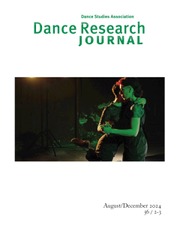Article contents
The Reda Folkloric Dance Troupe and Egyptian State Support During the Nasser Period
Published online by Cambridge University Press: 07 December 2017
Abstract
In 1958, Mahmoud Reda founded the Reda Troupe and put his interpretation of Egyptian folkloric dance on stage. This article analyzes the historical factors that allowed for the Reda Troupe's success and popularity during the Nasser period (1954–1970). Although colonial influences and problematic representational politics are evident in Reda's choreographies, his dances also showcase agency, hybridity, and artistic collaboration. The agency of both Mahmoud Reda and his troupe during the Nasser period was central to the group's artistic success and longevity.
Keywords
- Type
- Articles
- Information
- Copyright
- Copyright © Dance Studies Association 2017
References
Works Cited
- 1
- Cited by


